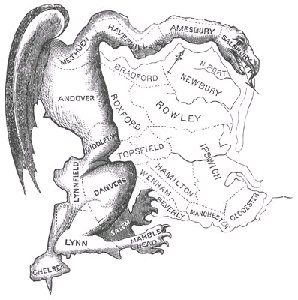I was listening to Weekend Edition on NPR and heard a pollster say “gerrymandering” with a hard “G,” as in “gate.” It turns out that such a pronunciation is a shibboleth which betrays someone as a true political junkie, because they know that the term derives from the name of Massachusetts Governor, Elbridge Gerry (who pronounced his name that way). In 1812,
Two reporters were looking at the new election map and one commented that one of the new districts looked just like a salamander. The other retorted that it looked like a Gerrymander. The name stuck and is now used by political scientists everywhere.
Here is a picture of the first “gerrymander”:

There is certainly a long history of this kind of thing in America, although it has gotten significantly worse in recent years (and is now mostly referred to as “redistricting”). This year most congressional races will be uncontested.
While all 435 seats in the U.S. House are up for election this November, the truth is that, as in previous years, only about 25 to 40 seats are truly contested. Those races get the national attention, help from party headquarters and, most important, money.
Redistricting and the power of incumbency have made most members of Congress unbeatable. Only four incumbents lost to challengers in the 2002 general election.
For 90% of voters, their votes in House races matter very little.
There are some interesting proposals to reform the system. That put forward by Matthew Yglesias is probably the most sensible. But I am always skeptical about procedural reform. Not because it isn’t necessary — it is — but because those in power will always, in time, figure out a way to exploit the system. But I can think of one proposal that might just work!
Chess Grandmaster Bobby Fischer (who happens to be a racist lunatic, but we’ll leave that aside for now), got tired of the fact that so much of Chess had come down to the ability of players to memorize books of Chess openings. The top players often have teams of researchers working for them analyzing every opening ever used by their opponent. So, in response, Fischer suggested “random chess” in which the starting position (column only) of each piece would be different every time the game was played! I think this is brilliant, and I propose that we have random congressional districts!
You might object that this would be too costly because it would require constantly changing the districts, but that is exactly what happens now, except the politicians themselves get to draw the maps!
Most democracies hand over this job to independent commissions, which content themselves with tinkering with existing boundaries. In America, in all but a few states, that idea sounds elitist and undemocratic. So every ten years, after the census, politicians in state legislatures meet to draw new voting maps which are approved by the state governor.
There have also been two recent changes which are partially responsible for making things worse:
First, new software has made it easier to draw more “reliable” electoral maps—ie, to be more exact in your partisanship. Until the 1990s, legislators had to draw districts using coloured pens on acetate sheets spread out on big maps on the floor. Computers appeared in the 1990s, but only big, sophisticated ones could handle the demographic data, putting the cost beyond all but a few states.
Now the Census Bureau puts out digitised maps, called TIGER/Line files. New geographic information systems for mapping and analysing demographic data cost only a few thousand dollars, work on ordinary Windows operating systems, and can draw up partisan maps automatically. This has turned gerrymandering—sorry, redistricting—from an art into a science.
Second, the 50-50 split in the 2000 election has changed what the parties want from redistricting. Under the old plans, you maximised your seats by drawing up districts which you would win narrowly. That was risky, because it gave your opponents a chance. Now the parties have adopted a policy of safety first. Because the House of Representatives is so closely balanced, legislatures try to maximise the number of safe seats for each side, drawing competitive districts only if they cannot avoid it.
No system would be perfect, but we certainly deserve something better than what we have.
